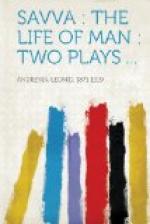[Man speaks the following in a loud, powerful voice, one arm about his wife as if to protect her, the other arm fiercely extended toward the Unknown.
MAN’S CURSE
I curse everything that you have given. I curse the day on which I was born. I curse the day on which I shall die. I curse the whole of my life, its joys and its sorrows. I curse myself. I curse my eyes, my ears, my tongue. I curse my heart and my head, and I fling everything back at your cruel face, a senseless Fate! Be accursed, be forever accursed! With my curses I conquer you. What else can you do to me? Hurl me to the ground, I will laugh and shout in your face: “Be accursed!” Seal my mouth with the clamps of death, with my last thought I will shout into your stupid ears: “Be accursed, be accursed!” Take my body, tear at it like a dog, drag it into the darkness—I am not in it. I have disappeared, but disappearing I shall repeat: “Be accursed, be accursed!” Through the woman whom you have insulted, through the boy whom you have killed, I convey to you the curses of Man!
[He turns in silence, with fiercely uplifted hand. Someone in Gray listens passively to the curses. The flame of the candle flickers as if blown by the wind. Thus they stand for some time in tense silence confronting each other, Man and Someone in Gray. The wailing behind the scenes grows louder and more prolonged, passing into a doleful chant.
CURTAIN
THE FIFTH SCENE
THE DEATH OF MAN
An uncertain, unsteady, blinking light, so dim that at first nothing is distinguishable. When the eye grows accustomed to it, the following scene becomes visible.
A long, wide room with a very low ceiling and windowless. The entrance is down a flight of steps from somewhere above. The walls are bare and dirty and resemble the coarse, stained hide of some huge animal. Along the entire back wall up to the stairs runs a, bar with a top of smooth glass. This is covered with bottles full of differently colored liquors that are arranged in regular rows. Behind a low table sits the Bartender, immobile, with his hands folded across his paunch. His white face is blotched with red. His head is bald, and he has a large, reddish beard. He wears an expression of utter calm and indifference, which he maintains throughout, never changing his seat or his attitude.
Drunkards, both men and women, sit at small tables on wooden stools. Their number seems to be augmented by their shadows dancing on the walls and ceiling.
It is one endless monotony of repulsive ugliness and desolation. The men’s faces resemble masks with the various features disproportionately magnified or reduced: big noses, or no noses at all; eyes staring savagely, almost starting from their sockets, or eyes narrowed to scarcely visible slits and points; huge Adam’s apples and tiny chins. Their hair is tangled, frowzy, dirty, covering half the face on some of them. Despite their differences, a horrible sameness is stamped upon their faces: a greenish, ghastly tinge of decay and an expression that appears grotesque in some, gloomy and stupidly timid in others.




